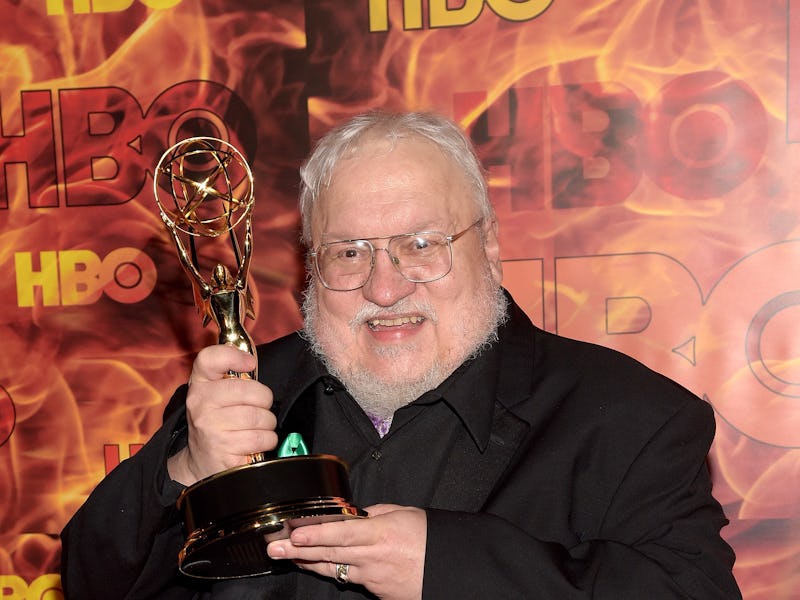Should George R.R. Martin Be Blamed for Delay of 'The Winds of Winter'?
It's tempting to blame the writer. But it's wrong. Except also maybe a little bit right.

I don’t blame George R.R. Martin for not being done with The Winds of Winter in time for the sixth season of Game of Thrones. Have you ever gone in deep with a writer on their process? There is no magical path to successful writing. Some writers do their thing at the crack of dawn. Some write an entire television series between midnight and 6 a.m. (It’s probably best not to get into alcohol or other performance enhancers.) Some can’t write with music, some need lyrical music, and some of us like the densest remixes we can find.
There’s also a shocking amount of time spent not-writing, letting ideas simmer, letting wrists and brains rest, doing anything except staring at a blank screen pounding out horrible letters that twist into words that mush into sentences that will be deleted later anyway because forced writing often makes things worse.
So it’s utterly ridiculous, without intensely personal knowledge of George R.R. Martin’s writing process, to blame his recent celebrity for the delay. Going to Emmy ceremonies no more delays a years-long project than visiting a family, and blogging about football should be seen as a necessary release instead of a distraction from spending every waking hour putting fans’ precious stories on the page.
And yet, George R.R. Martin may not be fans’ bitch, but he deserves some responsibility for creating a story. It’s difficult in this case, if not impossible, for the writer to live up to the standards he’s set for himself. Procrastination, we’re told, is often linked to perfectionism: the impossible difficulty of living up to the standards we believe we’re held to. It’s hard to believe any writer would be held to higher standards than GRRM right now, since he’s not only reshaped the entire fantasy genre, but he’s also the creative force behind arguably the most important show on television right now, world-wide.
But it got that way because he made it that way. The story that George R.R. Martin tells in A Song of Ice and Fire is popular because he wrote it in a specific fashion that both made it popular, and made it difficult to progress and especially conclude well. Martin sold his creative soul to a devil that has been trying to take its prize for a decade and a half now.
To put it simply, the scope of the Game of Thrones series has changed dramatically since its beginning. The crucial shift: it moved from the story of its specific characters — the Stark family, plus Tyrion and Dany — to the story of the world of Westeros. The list of point-of-view characters has added Martells and Greyjoys, and the story has moved its characters around so that every location of importance has a point-of-view character, instead of the POV characters existing on their own. The best example of this is Dorne, which, in the novels, didn’t have Jaime and Bronn, and Ellaria wasn’t that important — every major character in that region was entirely new, because Martin decided that the story of that region was essential to his narrative (and then failed to justify why, across two massive novels).
The disappointing Dorne in 'Game of Thrones'
As such, the more recent novels in the series: A Dance with Dragons, A Feast for Crows, and parts of A Storm of Swords have felt downright bloated. They add plot depth for its own sake, leaving characters and narrative momentum out to dry.
Yet on the other hand, details like these are how Martin became a superstar in the first place. He successfully created a world where fans wanted to know these details. In recent books, he’s given that to them, and he’s been rewarded with celebrity, influence, and presumably wealth. But in addition to time — the first three novels came out across five years, the next two, 11 years — the latest books have declined in quality as well. It would not be difficult to rank the five books so far as with the first three being the best (and the TV series largely matches this as well, although I personally think the second season was probably worse than the fourth).
The story bloat has severely damaged the momentum of the novels, and it shows. Beyond whatever GRRM’s process might be, the project of trying to maintain all the disparate story threads at the same time, and weave them into a satisfying novelistic narrative, seems overwhelming at every possible level.
As a person, it’s easy to sympathize with the choices that George R.R. Martin made and is struggling with. And hell, who can begrudge someone who’s been in the science fiction & fantasy trenches for decades taking advantage of sudden fame? But whether it was a conscious or unconscious choice, Martin’s business strategy decisions led him down that road. George R.R. Martin deserves our sympathy, perhaps, but it’s the sympathy of a cautionary tale. He caught the tiger of serialized storytelling by its tail, and is dealing with the consequences.